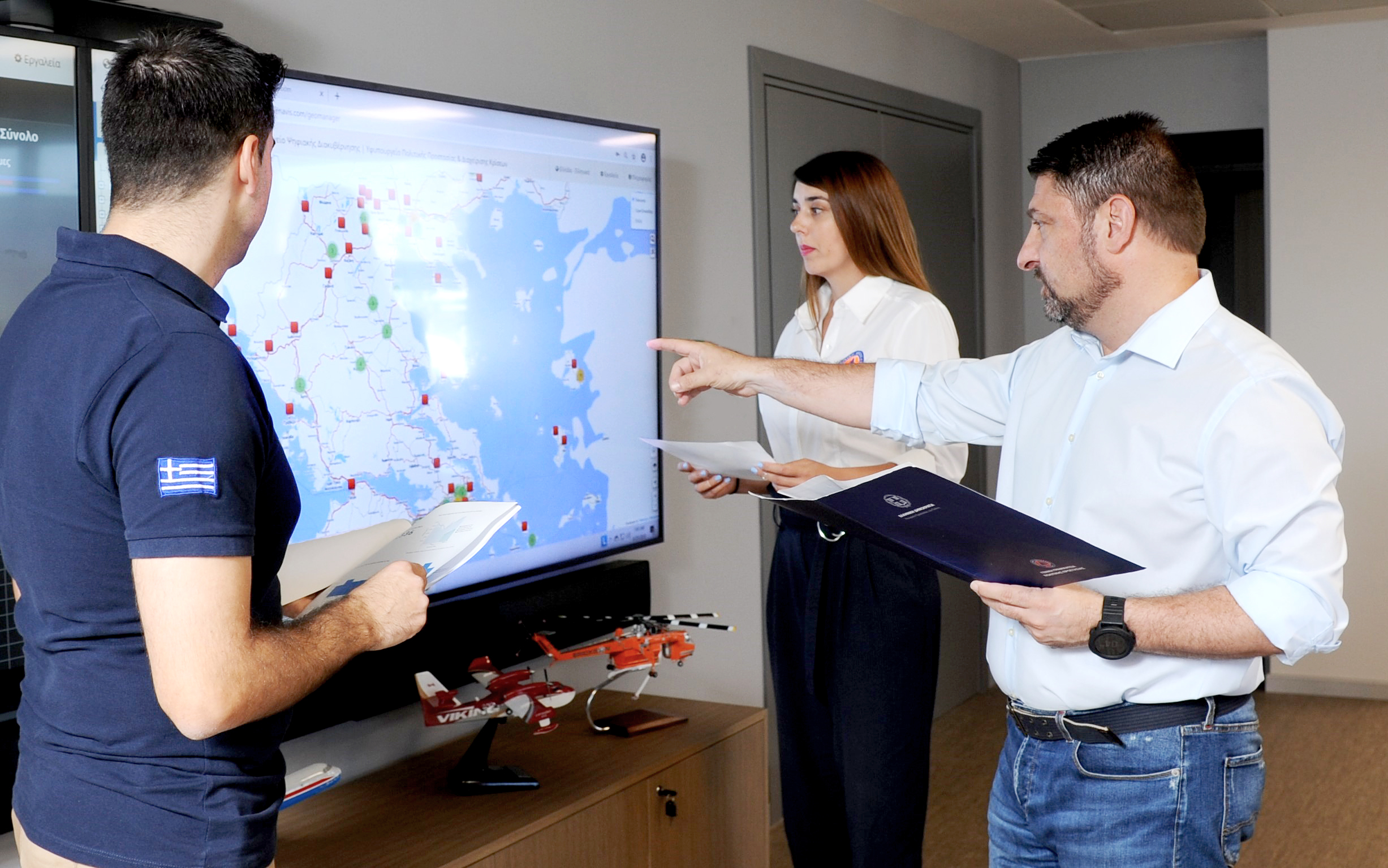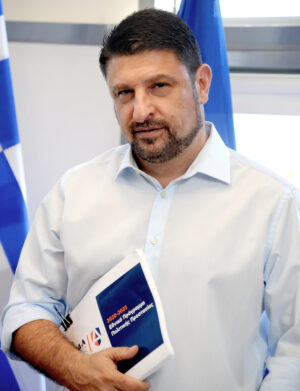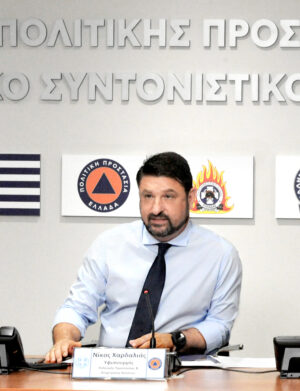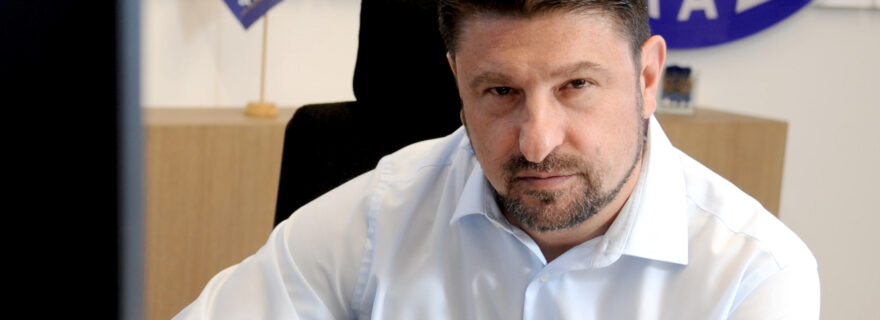————————
INTERVIEW OF THE DEPUTY MINISTER FOR POLITICAL PROTECTION AND CRISIS MANAGEMENT, Mr. NIKOU CARDALIA TO PANAGIOTA SURTZI
For the “uninvited” visitor that changed our lives, the coronavirus, and for the “threat” from the future, the climate crisis, speaks in an exclusive interview with grtraveller, the Deputy Minister of Civil Protection and Crisis Management, Mr. Nikos Chardalias, stating that “…all together, citizens and state… will copeto the end of this ordeal

ς”.
- What are the main priorities for the response to the coronavirus pandemic in the coming period?
We are at a critical phase in thethe antiWe need to fight the pandemic, as we are called upon – after this year’s difficult summer – to create a new normal with coronavirus still present. And that means getting our schools back to work safely, getting our economy back on track, supporting those most affected, continuing to protect our most vulnerable citizens, shielding our country’s health system even further and preparing for any next wave of the pandemic. The coronavirus was a huge test for all of us, for the entire state apparatus, for our society, but also for each of us personally. And we managed to cope.
“Our priority, as Civil Protection, and as a government as a whole, is to continue to respond as effectively as possible to this challenge.
It is a difficult gamble, a multi-factor equation with terms that change daily. But, we have made it so far, together, citizens and State – so we will make it to the end of this ordeal.
- Which measures have so far proved to be particularly effective and which ones do you have in your quiver for the worst case scenario of the virus spreading in our country?
Personal protection measures, in accordance with the advice of our experts, the correct use of masks, distance, the practical and daily behaviour of social responsibility demonstrated with admirable patience and consistency by the vast majority of citizens – this is our shield against coronavirus. And at this point let me stress that we are prepared for all scenarios, as we have been prepared in good time since the beginning of the pandemic. But we have managed not only to avoid the worst, but to make Greece a global example of successful crisis management. And so we continue. We have put in place a mechanism that allows us to monitor the situation on a daily basis with the greatest possible precision – and to intervene where necessary with emergency measures, with targeted actions that have proven their effectiveness. The successful, very recent examples of, for example, Poros and Ampelon Larissa, where we implemented immediate measures and immediately saw results, show that our strategy is moving in the right direction. The steady cooperation of citizens and the trust of all of us in the instructions of the experts are the basic prerequisites for avoiding, as far as possible, the further spread of the coronavirus in our country.
- How much did the opening of the borders and travel from abroad contribute to the spread of the virus in our country?
We have implemented a standard system of travellers’ checks from the outset – a system on which many countries have asked us for expertise. No one comes to Greece without having their epidemiological profile checked, and thousands of tests are carried out every day at the country’s entry gates. And we have not hesitated to impose additional restrictions on travellers from specific destinations where this was deemed necessary, such as mandatory negative molecular testing before arrival, quarantine, etc. The increase in cases, mainly observed in August, was primarily a consequence of the relaxation of self-protection measures. And, as I said, with targeted interventions, but also with the cooperation of our citizens and visitors to our country, we are reducing the spread, keeping the situation under control and continuing the fight.
In your opinion, what are the reasons for the reactions of some people against the government’s measures and announcements on coronavirus? What would you say to these people?
World fatigue is natural and expected. Who among us doesn’t want their normalcy back? His life without restrictions, without the stress we experience every day because of the coronavirus? But let us not deceive ourselves, the pandemic is a reality that does not forgive irresponsibility, that does not allow us to be complacent. And to those who react, especially with irresponsible behaviour, I have only this to say:
“The life and health of all of us are non-negotiable goods, let us not risk them uncritically.
 Not because the government says so, but because the social responsibility that accompanies every aspect of our daily lives demands it. Because only then will we protect not only ourselves, but above all, the people we love and want to keep close to us.
Not because the government says so, but because the social responsibility that accompanies every aspect of our daily lives demands it. Because only then will we protect not only ourselves, but above all, the people we love and want to keep close to us.
What would you say to young people, especially young people, who see their lives, their habits changing?
You know, young people are the most adaptable to change. It may be more difficult to “convince” them, in the sense that carelessness is an element of their age, but when they understand the criticality of the moment, then we find in young people our best allies. And what I have to tell them is that
‘ life does not stop, travel, experiences, experiences, socializing, company, fun do not stop – they just adapt to the circumstances.‘ For a while longer, they too are called upon to protect with their attitude all those they care about and love. And let us not forget that none of us is invulnerable to the coronavirus, not even ourselves. But their crucial contribution to this common effort is first and foremost to shield all others who do not have the privilege of age. Our young people – I am sure – will again make a difference!
Alongside the coronavirus issue, we are seeing extreme phenomena related to climate change (floods, fires, dust, etc.). How important is this issue, in your opinion, both for the present and for the future of the country?
The climate crisis – because, unfortunately, it is now a crisis – is a reality against which we all need to shield ourselves. It is a global challenge, but within the scope of our responsibility, we are moving quickly to shield our country in order to effectively defend the lives and property of Greek citizens, as well as our natural wealth. We are reforming the Civil Protection and the Fire Brigade as a whole. We have created the National Crisis Management and Risk Mechanism – a modern, vertical structure where it is now clear who is responsible for what and in what timeframe, in order to solve chronic problems of overlapping responsibilities and diffusion of responsibility. With one central and 13 regional operational centres, with the cooperation of the Regions, the Municipalities, the entire state apparatus, but also the scientific community, we are upgrading our technological tools, we are strengthening our immediate response forces, we are acquiring new means.
‘ With a three-year horizon, we intend to deliver a fully restructured Civil Protection system – the “Shield” programme
against any disaster.
And, as the Prime Minister has stressed, the coronavirus crisis has pushed us to move even faster. Many of our new tools are already here, working, with immediate results.
What is the ministry’s plan to manage and/or prevent such situations?
As I said, we have either has proceeded with the preparation of a comprehensive strategic plan for the reform of Civil Protection which is currently being implemented. And in this context, let me make two points in particular. The first is preparedness, i.e. the advance development and use of the latest technological tools and scientific data to ensure the best possible response to any disaster. The second is prevention. In this direction,
has proceeded with the preparation of a comprehensive strategic plan for the reform of Civil Protection which is currently being implemented. And in this context, let me make two points in particular. The first is preparedness, i.e. the advance development and use of the latest technological tools and scientific data to ensure the best possible response to any disaster. The second is prevention. In this direction,
“We have developed – and I consider this very important – comprehensive General Emergency Response Plans for any natural or technological disaster, which ensure a prompt and coordinated response by all stakeholders.
We are also taking specific corrective actions, planning infrastructure projects with the cooperation of local stakeholders, strengthening our forces where necessary and aiming to gradually implement a full information and education programme starting in our schools.
Will there be, in your opinion, a complete return to the pre-coronavian era or are we going to have to adapt to a new reality from now on?
The pandemic is in full swing worldwide. Of course, we all await the results of the efforts of the scientific community, but for now, we should all behave with the responsibility that is appropriate to the situation. This is the only way to protect ourselves, not only now, but also for the future. Because in any case, the pandemic will leave its imprint on the post-coronavirus reality. So let’s be careful now – only in this way do we each increase the chances that this crisis will end as soon as possible for everyone.
What is your favourite habit that relaxes you after a long day?
The contact, the communication with my family. I see them much less than I would like to, but the support they give me every day is my personal refuge.
Your two favorite destinations in Greece and abroad?
I always return to Evritania, the place of my childhood memories. I travel as much as I can in our country – Greece is so beautiful that wherever you are, the people, the landscapes, the life, everything is unique. Travelling abroad is part of my obligations and I don’t pick a destination, as wherever I go, everything comes back home.















